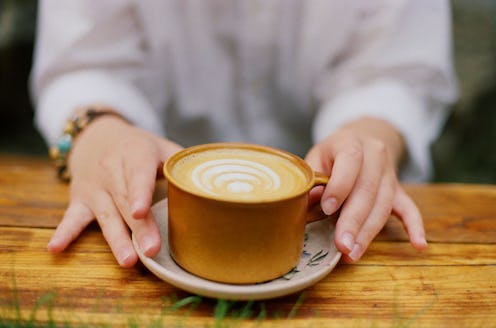Life
The U.S. Army Has A Scientific Formula For How Much Coffee You Should Drink

It's something I ask myself on a daily basis: am I drinking too much coffee? But the days of wondering may soon be over, as scientists in the U.S. now have a formula for how much coffee you should drink, Inc.com reports. That's right — it's time to go scientific on your caffeine habit.
The commentary on caffeine is at times contradictory and — ironically — a little exhausting. One minute caffeine addicts are living forever, as reported by Time magazine, the next they are supposedly more susceptible to a host of life-threatening illnesses, including heart disease and cancers, as published by the Daily Mail. But what if there was an actual caffeine calculator, which enabled you to work out how much coffee you needed to keep you awake depending on how much sleep you had?
Geniuses within the U.S. military are devising this very thing, as the result of studies that have spanned decades. And no wonder, as according to reports, soldiers are among the most sleep-deprived workers, with 40 percent of U.S. army men and women getting under five hours sleep a night according to Inc.com — and that's nothing compared to what they get when they're actually in the field. Using data compiled from servicemen and women, the scientists have developed a mathematical formula to help coffee drinkers deduce the optimal amount they should be drinking in order to feel fully awake and alert, and it could be available for us to use very soon.
Dr Jaques Reifman, co-author of the latest research and a member of the team at the U.S. Army Medical Research and Materiel Command in Fort Detrick, Maryland, told Inc.com: "This is leveraging ten years of research on sleep deprivation. How do humans respond to continuous sleep deprivation of 60 hours? How is that different from when you sleep three hours a night for 10 days? ... What we're doing here now is to develop math equations that describe the phenomenon."
The report, which was originally published in the Sleep journal in 2016, aims to calculate two things: firstly, how much caffeine a regular sleep-deprived person needs in order to feel awake, and secondly the impact different measures of caffeine have on each individual person, and how they should manage their intake throughout the course of the day. "For the first time, we showed that a mathematical model can accurately predict the effects of single and multiple doses of caffeine on group-average performance across the continuum of sleep loss — from limited nightly sleep to continuous sleep loss — for multiple nights," the study stated.
The good news for us is that the U.S. Army are planning to license the technology, meaning that it could soon be available to download, potentially in the form of an app for smartphones. But before that happens, the Wall Street Journal highlighted a couple of calculations for the "average" person, such as: If you're averaging five hours of sleep, aim to drink two cups of weak coffee when you wake up, followed by another two cups four hours later; or if you're a good sleeper but anticipating a night of no sleep — i.e. a night shift or similar — drink two cups of weak coffee at the start of your shift. Unsure what constitutes a weak cup of coffee? The study states a cup containing about 100mg of caffeine; if you buy your coffee on the go every morning, you might be surprised by the levels your daily caffeine fix contains; according to a report published by the Metro, drinks by Costa have the highest caffeine content. But one caveat: a recent study reported by Newsweek noted that people metabolise coffee at different speeds, so some people can tolerate the physical effects better than others.
As a shameless caffeine addict, I salute those honourable scientists — all the perks of coffee with none of the restless jitters or anxiety? I'm sold. If, in the meantime, you're looking for some signs that you're drinking too much caffeine, there are a few red flags to look out for. Yikes — better hope that app comes sooner rather than later.